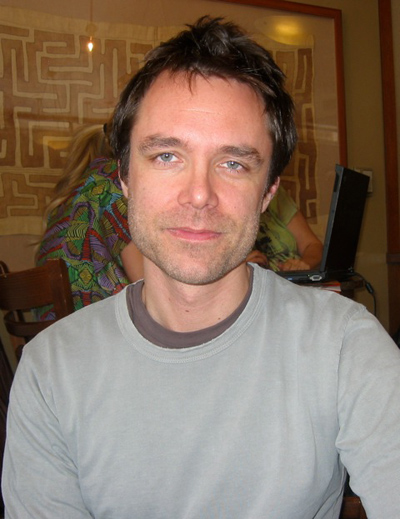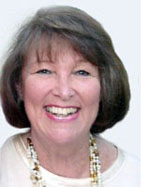
By Cynthia Citron

LOS ANGELES– “If Jerzy Kosinski were here right now, he’d probably be hiding under the table pouring tea a few drops at a time into your shoe. He actually did that once to Warren Beatty.”
Playwright Davey Holmes is sitting in Peet’s Coffee Shop talking about the protagonist of his play, More Lies About Jerzy. With him is actor Jack Stehlin, who plays “Jerzy Lesnewski,” the character based on Kosinski, the outrageous novelist of the ‘60s and ‘70s who scandalized his contemporaries by inventing his life as he went along.
“We all invent our lives,” Holmes says. “We fictionalize the past to make it as exciting as possible. But there is usually a seed of truth behind it. Kosinski might be called a pathological liar, but you can’t help but empathize with him and be fascinated by him.”
“He was wonderfully different,” Stehlin adds. “He brought his own set of artillery to bear: weapons of charisma and imagination.”
“This play is not a biography,” Holmes notes. “Kosinski wouldn’t necessarily see himself in it, but I think he would be completely tickled by it. Figuring out what is or isn’t true isn’t the point.”
“I don’t think you can be totally honest when you’re recollecting anything. Nobody recalls the past truthfully,” Stehlin says. “And a white lie is what you do when truth isn’t as good an option. Jerzy would always ask ‘What is truth?’ and I think his truth came from the combined conscious and unconscious rendering of his story.”
“People lie to endear themselves to the world,” Holmes offers. “They lie to be exciting and interesting. But as far as Jerzy is concerned, I don’t think you can lie this effectively and not believe it.
“Jerzy created his whole back-story,” he continues. “He made conscious choices about who he was, and I’m particularly fascinated by people who invent themselves.”
The psychological aspects of Jerzy’s story come naturally to Holmes, who won a Writers Guild of America award in 2008 for his participation in the acclaimed HBO series In Treatment; he wrote the episodes that featured Gabriel Byrne and Dianne Wiest. He has also written for Pushing Daisies, Damages, Happy Town, and Law and Order,” and has a new pilot, Worthy currently at FOX.
And, as if his own psychological musings weren’t enough to keep him engaged, he recently married actress Sonya Walger, who plays Penny Widmore in the mind-boggling series Lost.
Jack Stehlin, on the other hand, is a long-time New York stage actor with many Shakespearean and other classical credits (including Salome and Julius Caesar with Al Pacino), and is the Artistic Director of Circus Theatricals, the company responsible for bringing More Lies About Jerzy to the Los Angeles stage.
The third member of this producing triumvirate is director David Trainer, who Holmes calls a “brilliant collaborator,” “super-enthusiastic,” and who brings “the energy of support” to the work. Trainer, who has worked with Holmes for the past six years to refine the play from its original two-and-a-half hours (in its London and off-Broadway productions in 2001) to its current 90+ minutes for its west coast premiere in L.A.
“Trainer has a knack for developing new plays,” Holmes says. “So many directors are overly invasive, or else they treat the work with reverence. Frankly, I was overdosed on this play, but Trainer got me excited and got me started on it again.
“There is a mythology about New York,” Holmes adds, “but L.A. is the place we do our art. I’m delighted for any life this play has here.”
“It’s a humble and hopeful act to do theater,” Stehlin says. “Theater is a spiritual event. We are servants in society, gathering our energy to share so that everyone will disappear into the idea. It’s got to mean so much to you now, otherwise you won’t be able to pay the price.
“It’s not an easy game,” he continues, “especially here in Hollywood, where movies and TV are so demanding and distracting. There is no through-line, as there is in theater. You are acting from moment to moment and the director and editor have the responsibility for how it all turns out.”
“Changing Jerzy’s last name in this play was not just a legal maneuver,” Holmes says. “It provided a huge breakthrough creatively because it freed me to make up his life.” Kosinski was a character who was apparently larger than life, and while Holmes was working on his play in New York he was continually confronted by people who had known the novelist. “They all told me stories about him, and all of them were completely contradictory,” he says.
Eventually, Kosinski’s stories caught up with him and he was especially vilified for having written The Painted Bird, a supposedly semi-autobiographical novel about his experiences during the Holocaust. “Fiction is the business of lies,” Holmes says, quoting Roman Polanski, Kosinski’s fellow Polish Jew. “But lying about the Holocaust is not acceptable. You don’t want to dishonor people who lived, or didn’t live, through it.”
“If you mention the Holocaust, you’re hurting somebody,” Stehlin says, “but I am hired for this play to defend Jerzy—to be his advocate. Life is too mysterious to be objective. Everybody’s striving to become what they admire, to be what they want to be. Everybody’s pulling off a magic act.”
Jerzy Kosinski’s magic act, More Lies About Jerzy, opens May 15th at the Hayworth Theatre, 2511 Wilshire Blvd., in Los Angeles and runs Fridays and Saturdays at 8 p.m. through June 26th. Call (323) 960-7788 for reservations.
*
Citron is Los Angeles bureau chief for San Diego Jewish World